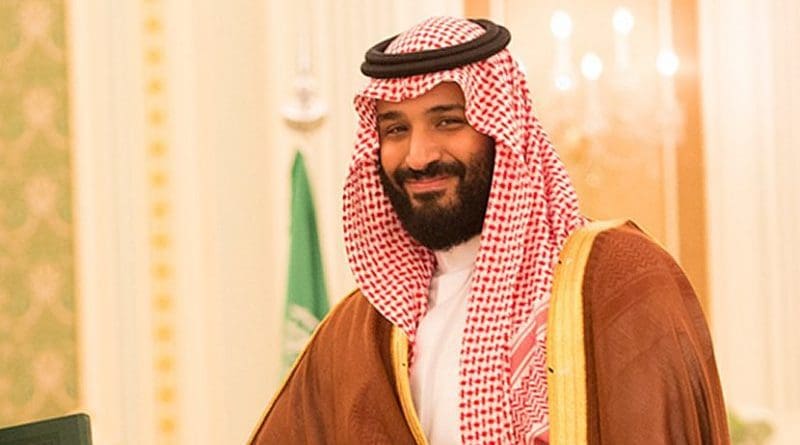Muhammad Bin Salman: The Delusions Of Borrowing Protection – OpEd
Ever since Muhammad Bin Salman otherwise known as MBS assumed the de facto leadership of Saudi Arabia, his rule has evidently been synonymous with one controversy after the next.
Arbitrary detentions of critics, torturing family members during shakedowns, executing a revered cleric, creating a catastrophe in Yemen and of course sending servants of the absolute monarchy to bone-saw and then dismember a dissident journalist at its consular properties in Istanbul.
That these actions ultimately stem from a profound sense of insecurity about his family’s near-century old grip on power waning partly from a growing lack of domestic legitimacy, is of little surprise.
However, a more decisive factor that’s been feeding into his insecurities has been a sense of helplessness induced by an inability to impede the growing regional influence of arch-rival Iran which the House of Saud has historically perceived as malign and divisive.
Yet it would be a combined drone and missile strike claimed by Yemen’s Iran-backed Houthi movement against the Kingdom’s largest oil processing plant at Abqaiq in 2019 – knocking out half its daily production of oil together with five per cent of global supply in the process – that changed his balance of calculations on internal security.
The Islamic Republics support for the Houthi movement which continues to result in regular attacks against critical Saudi infrastructure, its controversial nuclear program, asymmetric expansion in the Middle East and championing of the Palestinian issue – long cause cèlébre of the region – has rendered MBS into pursuing a classic enemy of my enemy is my friend strategy as a counter.
In a move that may in the long run be perceived as self-defeating even if it remains below the radar for now, MBS appears to be gradually compromising his Kingdom’s security through an increase in security coordination and cooperation with Iran’s arch enemy, Israel.
A briefer
Although Saudi Arabia’s growing cooperation with Israel has been an open secret for nearly a decade, it has only become more evident in recent times and not merely because its spy agencies use Israel’s sophisticated Pegasus software to target dissidents both at home and abroad.
The once-unthinkable granting of permanent overfly rights for Israel’s national airline El Al, the widely believed meeting between Israel’s Prime-Minister and Crown Prince Muhammad in the holy land itself and its support for diplomatic relations between Israel and other Muslim and Arab states are to name but a few.
Yet what fails to get almost any coverage is the minutiae on direct military, security and technological assistance that Saudi Arabia has received or otherwise shared with Israel in an attempt to counter their mutual Iranian nemesis.
This is believed to involve the secretive deployment of Israel’s Arrow anti-missile system or at least variants of it in the Kingdom to protect critical oil installations as well as sensitive politico-military sites, sales of sophisticated weaponry, the stationing of Israeli intelligence operatives, training of fighter pilots as well as cyber-security coordination.
On face value at least, this cooperation was topped by Israel’s Nuclear-capable Dolphin Submarines being regularly stationed in and around the Persian Gulf in a message of reassurance to its newfound Arab allies together with one of deterrence for the Iranians.
The Jewish state, which has its own preoccupation with Iran and views everything from its missile development to space-faring drive as a crucial building block towards genocidally wiping her of the map, is only too happy to enhance this cooperation in line with a long-held desire to try and cage Iran wherever it can.
A nexus full of holes?
The core problem with MBS’s recourse to essentially borrowing Israeli strength as the cornerstone upon which the edifice of his new strategic defence vis-a-vis Iran will be built – albeit frustrated with existing American support – is that it builds weakness.
It builds weakness in him, the borrower, because it reinforces his dependence on Israel to get things done.
It builds further weakness because he’s forced to acquiesce elements of his Kingdoms national security to a foreign state that’s frenetically focused on securing its own crucial long-term security objectives before that of its client.
This in turn will inhibit the development of Saudi Arabia’s independent strength, its regional position, the authority of its rulers and their personal credentials in addition to the growth and discipline of its armed forces.
It will also build weakness in the relationship between the two because the weaker sides sense of fear and insecurity eventually replaces cooperation.
This leaves both parties involved to not only become more arbitrary and defensive in the short term, but ultimately one where the weaker side ends up being dictated terms as opposed to negotiating them in the long run.
All things considered, it’s extremely difficult to accept that even with this newfound Israeli cooperation and assistance against a mutual enemy the calculus of an MBS-led Saudi Arabia genuinely believes that it can offset or even counterbalance the power that Islamic Iran now projects in the region.
The Kingdom, by almost any measure, lacks both the wherewithal and the will that would be required to commit to a sustainable and prolonged struggle against what effectively amounts to an asymmetric superpower.
Yet Muhammad Bin Salman’s capacity to sell delusion to a people that he’s whipped into a frenzy of hatred and hysteria shouldn’t amaze anyone.
The Crown Prince, buoyed as he is by youthful dreams of glory and 2030 visions, is merely trying to chase an idolized alternative to his current politico-security predicament. The only problem is that he’s clearly taken a hedge against mortality and surrendered any sense of shrewd judgement in the process.
Unfortunately, educating him on the dangers and perils of it won’t make his desire to pursue it any less.
*Mohammad I. Aslam, Ph.D candidate in Political Science, Institute of Middle Eastern Studies, King’s College London.

